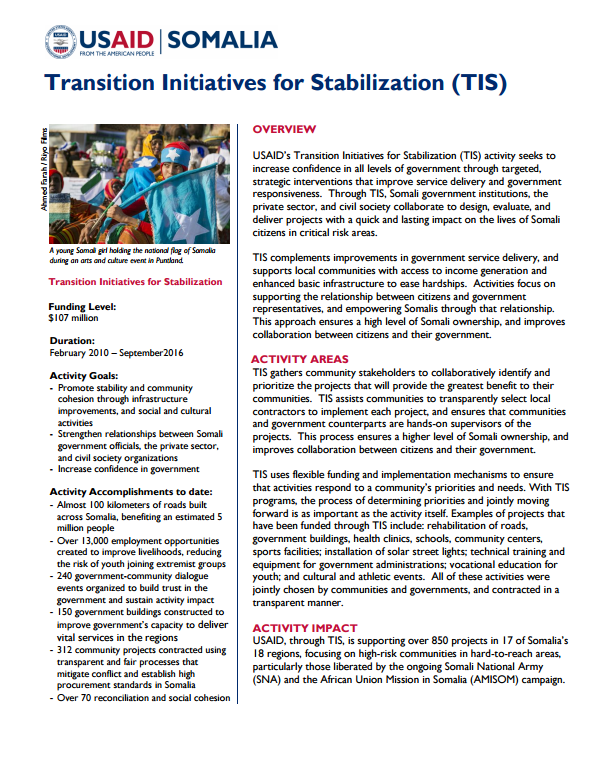Speeches Shim
![]() (131k) Fact Sheet - Somalia TIS
(131k) Fact Sheet - Somalia TIS
Transition Initiatives Stabilzation (TIS)
OVERVIEW
USAID’s Transition Initiatives for Stabilization (TIS) activity seeks to increase confidence in all levels of government through targeted, strategic interventions that improve service delivery and government responsiveness. Through TIS, Somali government institutions, the private sector, and civil society collaborate to design, evaluate, and deliver projects with a quick and lasting impact on the lives of Somali citizens in critical risk areas.
TIS complements improvements in government service delivery, and supports local communities with access to income generation and enhanced basic infrastructure to ease hardships. Activities focus on supporting the relationship between citizens and government representatives, and empowering Somalis through that relationship. This approach ensures a high level of Somali ownership, and improves collaboration between citizens and their government.
ACTIVITY AREAS
TIS gathers community stakeholders to collaboratively identify and prioritize the projects that will provide the greatest benefit to their communities. TIS assists communities to transparently select local contractors to implement each project, and ensures that communities and government counterparts are hands-on supervisors of the projects. This process ensures a higher level of Somali ownership, and improves collaboration between citizens and their government.
TIS uses flexible funding and implementation mechanisms to ensure that activities respond to a community’s priorities and needs. With TIS programs, the process of determining priorities and jointly moving forward is as important as the activity itself. Examples of projects that have been funded through TIS include: rehabilitation of roads, government buildings, health clinics, schools, community centers, sports facilities; installation of solar street lights; technical training and equipment for government administrations; vocational education for youth; and cultural and athletic events. All of these activities were jointly chosen by communities and governments, and contracted in a transparent manner.
ACTIVITY IMPACT
USAID, through TIS, is supporting over 850 projects in 17 of Somalia’s 18 regions, focusing on high-risk communities in hard-to-reach areas, particularly those liberated by the ongoing Somali National Army (SNA) and the African Union Mission in Somalia (AMISOM) campaign.
High levels of unemployment and lock of education among youth populations make them susceptible to violent extremism recruitment and sea piracy. To deter this from happening, USAID, through TIS supports youth engagement activities in sports and arts, as well as practical job skills training workshops. USAID has constructed, rehabilitated, and supported 14 sports facilities and dozens of sports initiatives that serve more than 50,000 at-risk youth across Somalia.
For example, in a community planning session held in December 2014 in Garowe, the capital of Puntland, citizens identified sports as an integral part of a community that can bring families together and offer youth active and healthy alternatives to violent extremism. In February 2015, USAID responded and organized the first girls’ basketball camps and tournaments ever to take place since 1991. Two new basketball teams were officially created, and with their new uniforms, equipment and eventually a new basketball court built in March 2016, the two teams grew to four and now have a number of games lined up for them in the coming months. Even a women’s sports steering committee was created so that games continue to be organized and supported.
Aniso Abdiazis, one of the basketball players told us, “Since we started playing, community perception of us has completely changed. People who used to shame us, now clap for us.”
USAID is changing the lives of thousands of Somalis overnight. Over 100 kilometers of roads has been built with more than 1,200 new solar street lights. One city, Baidoa, located 140 miles northwest of Mogadishu, has especially benefited. For years the citizens could not walk the streets at night. Businesses closed at 6:00 p.m. and people locked themselves up in their home in fear. Amina Hussein Haji explains, “Women could not walk anywhere because of the possibility of rape, robbery or killings by local gangs.” Citizens also ran the risk of militia attacks and violence occurring unimpeded, favored by the cover of darkness.
When USAID supported the local government with the installation of 27 solar streetlights on the main street in Baidoa, the life for residents changed. Amina has noticed the difference that the streetlights have made. “Since the lights are working, we can walk freely at night to shop and visit our neighbors without fear.”


Comment
Make a general inquiry or suggest an improvement.